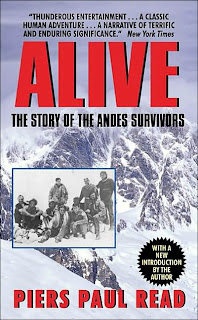 Alive
Alive
Piers Paul Read
Synopsis:
On October 13, 1972, a Fairchild F-227 was en route to Chile from Uruguay, bringing the Uruguayan Old Christians rugby team, along with friends and family, to a tournament in Santiago. As the plane passed over the immense Andes Mountains, a blanket of clouds blocked the vision of the pilot. Shortly after this change in weather, the plane ventured off course and began its descent into Santiago while still deep in the heart of the Andes. When some turbulence caused the plane to drop several hundred feet, the forty-five people on board were alarmed to see mountains nearly ten feet away from the plane’s wing. Suddenly, the tail, followed shortly by both wings, snapped off the Fairchild and the plane crashed into the snowy mountain valley. When the debris settled, only thirty-three passengers remained alive to face their terrible circumstances. Only minimal food remained on the plane, most of the luggage was lost, and many of the passengers were injured. In his book Alive, Piers Paul Read chronicles their desperate attempts to survive high in the Andes and the miraculous rescue, after seventy-two days, of sixteen crash survivors, finally able to escape their nightmare.
My Thoughts:
This is the second book I had to read for AP English this summer. Unlike the other survival story, Alive was not narrated by a survivor. Read was never involved with the accident and didn't know those involved until he started writing the book. This meant that much of the story wasn't very personal, and many emotional moments that really happened were dulled down by the book. One nice thing about this book was the more detailed discretion of the parents' search for the missing Uruguayans. It made up for some of the lack of emotion by sharing the parents' emotions. Also, though the start in particular seemed to lack emotion, the later half of the book felt very adventurous with the expeditions starting. Still, I cannot credit this to Read, but to the situation itself. Once again, this was not a pleasant book to read, especially since canibalism was the main method of survival, but it was still a good story that is important to hear from the view of the survivors.
Please leave your comments on this book, or your thoughts on nonfiction stories in general!
Follow Corey's Book Talk on Twitter!
Like Corey's Book Talk on Facebook!

No comments:
Post a Comment